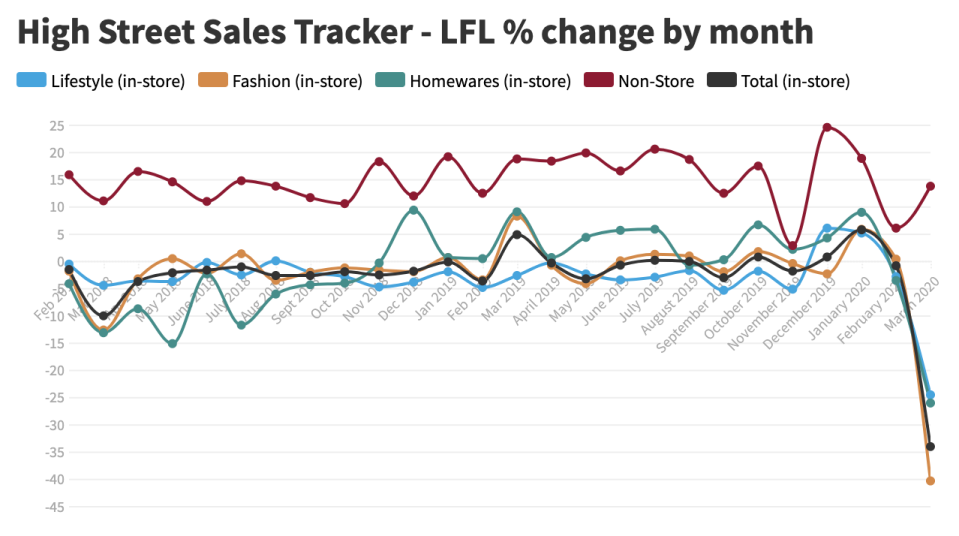UK high streets hit by lockdown suffer worst month on record

UK high street retailers suffered their worst month on record in March as they were hit by the coronavirus pandemic, new figures show.
Total like-for-like sales plunged 17.9% for the month as shoppers stayed shunned the high street as they observed government social distancing guidelines to prevent the spread of coronavirus, according to the latest monthly BDO high street sales tracker.
In-store sales fell to new lows, diving 34.1% after non-essential stores were told to close in the battle against the deadly virus.
Read more: Morrisons to give staff £1,050 coronavirus bonus
Every retail sector saw a decline this month with sales at fashion stores plummeting by 40.4%, homeware sales fell by 26.1%, and lifestyle shops showed a 24.6% decline.
Reduced footfall due to social distancing and isolation, diverted demand from discretionary to essential items, and the enforced closure of non-essential stores in the final week of March as the UK entered coronavirus lockdown all contributed to the worst results on record for total in-store like-for-like sales.
Online shopping grew in popularity as shoppers stayed at home rather than visiting bricks-and-mortar shops, with non-store like-for-like sales rising by 13.7%.

However, some retailers still suffered as fashion retailers experienced a substantial drop in demand across all channels this month as consumers turned their attentions to shopping for essential rather than discretionary items.
Sophie Michael, head of retail and wholesale at BDO, said: “It’s no surprise that March was the worst month on record for the high street, as the COVID-19 outbreak had an immediate impact on consumer demand for discretionary items.
“Understandably, shoppers are being very cautious with their pounds, as concerns about job security grip the nation. For most retailers, in-store sales make up the largest portion of their revenue, so they are having to rely solely on non-store channels and adapt aggressively to survive.
“It is likely that the pandemic has only sped up the shift away from in-store shopping as consumers become even more accustomed to buying on-line.
Read more: Fears government can't stop 'meteor hitting planet business'
“It is vital for all retailers to navigate and adapt through the immediate challenges ahead, whilst also starting to consider longer term strategic planning for the future once the lockdown lifts and normality resumes.
“For now, businesses and consumers will be looking to the government for help and clarity. Although many will welcome the extent of government support provided, most if not all retailers will still carry heavy costs associated with inactive shops.
“Ultimately, a frank and open dialogue is now needed together with collaboration from all parties to achieve viable outcomes.”

 Yahoo Movies
Yahoo Movies 
